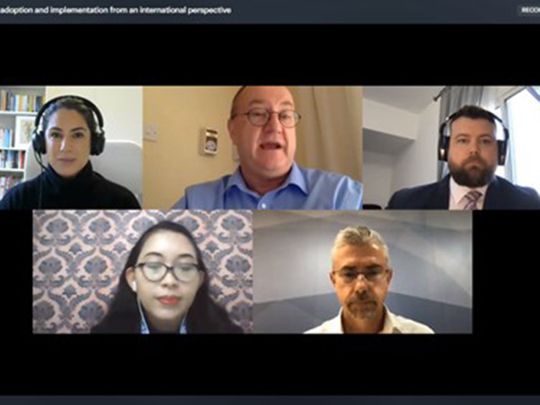Dubai: Some schools in the UAE plan to indefinitely carry on with certain distance learning features introduced during movement restrictions over the COVID-19 pandemic earlier this year, the ‘Gess Edtech Virtual Summit Dubai’ heard on Wednesday.
During a session on ‘Online learning — adoption and implementation from an international perspective’, panellists, including those from UAE-based schools, at the Global Educational Supplies and Solutions (Gess), narrated how the sudden shift to distance learning, although hard at the time in March, has provided valuable practises that schools would like to continue with even though they have reopened for physical teaching.
For example, teachers will continue to produce their own digital learning resources, such as videos and multimedia presentations, to supplement classroom teachings, which can be archived and reused as needed, panellists said. Students too will stay on the digital path with peer-to-peer online learning tools, among other options.
Students learning from students online
Richard Ballard, head of technology and innovation at Raha International School in Abu Dhabi, said: “With the chat function [of an online platform], what has worked really well within the class team, we’re noticing students being able to self-help each other; being able to ask a question and rather than it all being directed at the teacher, very often the students figure it all out between themselves. So, it’s like having almost separate channels of communication set up for that ability; I think we will look to continue with that possibly.”
He added that in the lower grades, another platform used by the school provides the option for an oral feedback from a teacher to students, instead of a typed comment. “This really took on a whole new level when the students were receiving feedback from their teacher, and rather than it being a written feedback, they were getting oral feedback like they would be getting in a normal classroom situation.”
Some of the school’s students “have, to a degree, progressed better online because they’ve actually faced less distraction than they would have in a normal classroom environment”, Ballard said, while clarifying that being in school physically was “number one” in terms of the general preference.
Virtual school events
Andrew Turner, head of education technology and innovation at Aldar Education, also based in Abu Dhabi, said: “During this unique time in history, we need to keep innovating as a school group,” pointing to moving its events virtually as an example. “In terms of the ‘new normal’, it was very important that we looked at some of the things that we do across our schools, like competitions, community events and summer camps” — all held virtually recently.
Upskilling teachers with tech
Derek Smith, head teacher, International School of the International Institute of Tropical Agriculture, Nigeria, said teachers at his school would continue becoming accredited and certified by a variety of online platforms so they could become proficient in their use and train other teachers as well.
Sutaningrat Puspa Dewi, co-founder, executive member-Beverly School Indonesia, International School Association Indonesia, also said they would continue to upskill teachers, besides keeping some staff meetings online. “We have to manage our expectations, and those are to expect the unexpected during these times,” she added.
Read more
- The Little Free Library in Jumeirah: Creating a community of readers
- Canadian-American student in Dubai offers UAE workers masks that will help keep them cool
- Mohammed bin Zayed issues resolution for board of trustees at new Abu Dhabi university
- Now, students can have all their certificates from Dubai private schools attested online
The panel of international school experts looked at some of the challenges, both raised and resolved by EdTech (educational technology), in international school settings over the last 12 months, discussing what lessons have been learned and what the future of EdTech in schools may look like going forward.

